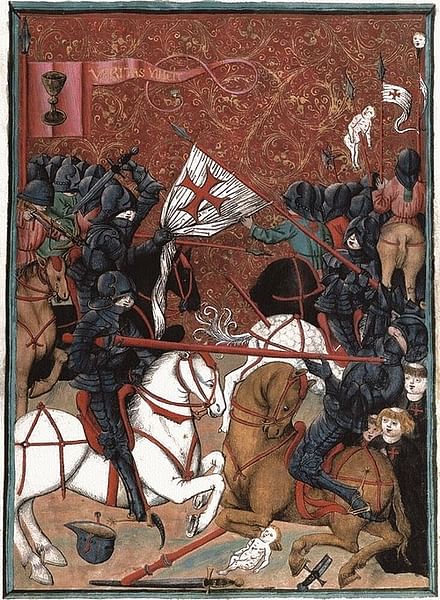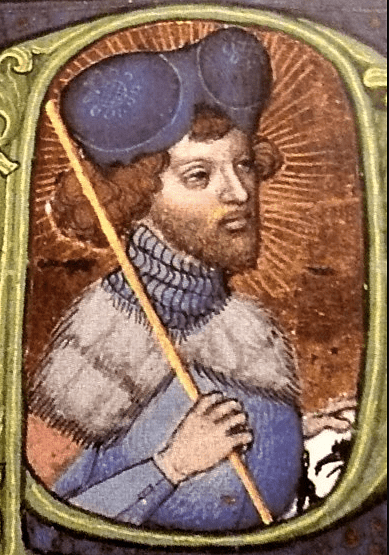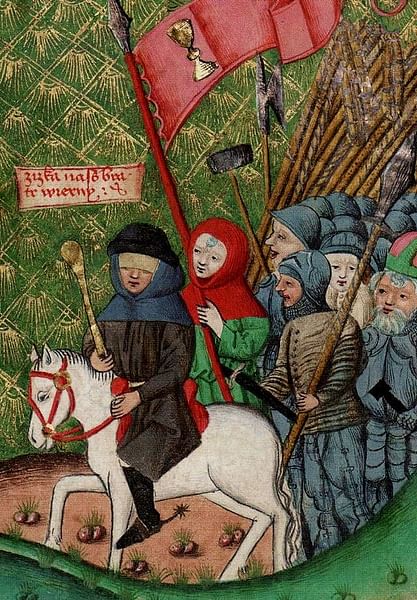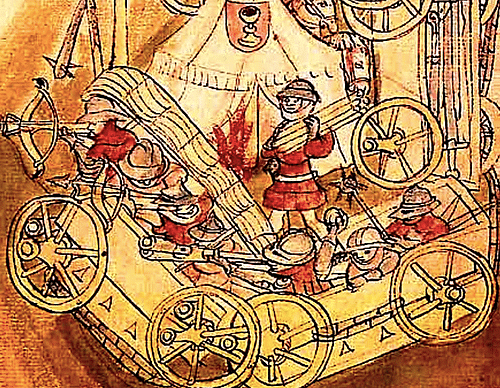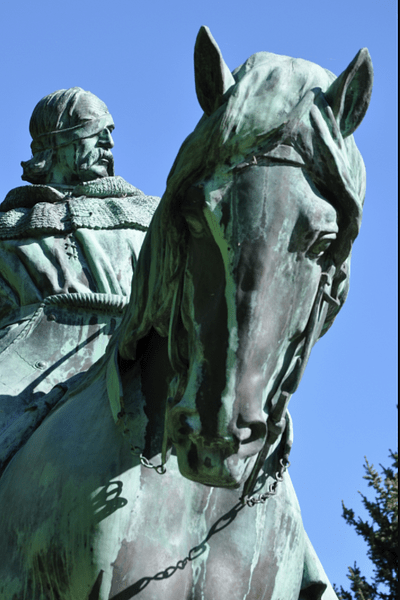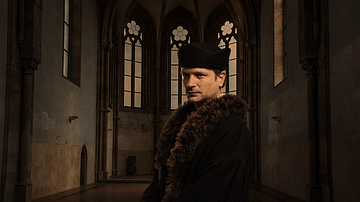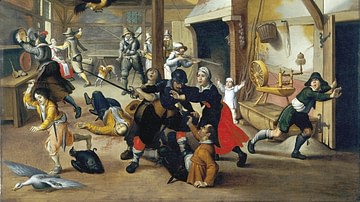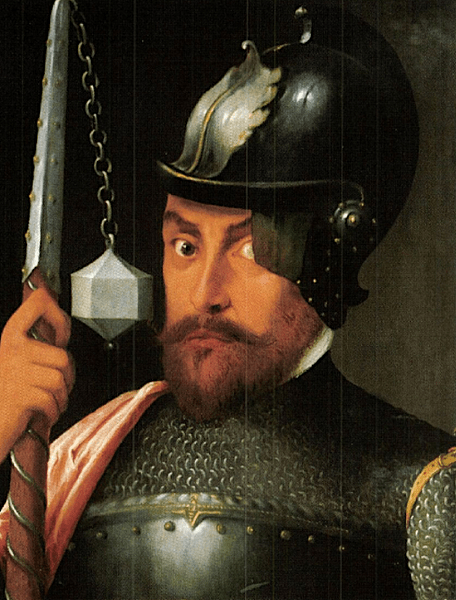
Jan Žižka (l. c. 1360 – 1424) was a Czech general and one of the most brilliant tacticians in military history. In the Hussite Wars (1419 to c. 1434), he was undefeated as the leader of the Hussites against the Catholic loyalists. Even completely blind toward the end of his life, he remained unvanquished and, today, is a Czech national hero.
Little is known of his youth but, by the time he was in his teens, he was involved in banditry and mercenary work. His family was landed gentry but seem to have been at the lower end of the hierarchy. Still, they were important enough for Žižka to become attached to the court of King Wenceslaus IV of Bohemia (r. in Bohemia 1378-1419, King of Germany 1376-1400) and was chamberlain to Wenceslaus IV's consort Sophia of Bavaria (l. 1376-1428). He may have fought for Wenceslaus IV against the House of Rosenberg, but this is unclear.
He enters history in 1420 after the Hussite Wars began as a leader of the radical Taborite faction of the Hussites which advocated a complete break from the Catholic Church. Žižka was victorious against numerically superior forces of professional warriors in every single engagement between 1420 and 1424 through a combination of military brilliance and innovation. He turned the weaknesses of his peasant army – their lack of arms and martial training – into strengths by arming them with simple farming implements they knew well how to use and turning their carts into war wagons which transformed a battle in the open into a defensive position. Since the wagons were mobile, however, they could also be used in offense.
Žižka had lost one eye in his youth and later lost his other but, completely blind, still was a better general than any who opposed him. He remained undefeated in 1424 when he died of the plague while on campaign. Understanding what his loss would mean to his army, he is said to have ordered his skin be removed after his death and made into a drum so he could continue to inspire his troops to victory. In the present day, he is considered one of the greatest heroes of the Czech Republic.
Youth & Mercenary Work
Žižka was born in the village of Trocnov, Bohemia to upper-class parents whose names are unknown (though many scholars have advanced various theories on their identities). He had at least one brother and a sister but there may have been other siblings. Scholars continue to debate the events of Žižka's life prior to 1420 but documentation is scarce. Scholars Tom Magnusson and David L. Bongard provide the basics of his life as a young man:
He was connected with the court of King Wenceslaus IV and held the office of chamberlain to Queen Sophia; lost an eye in the incessant civil strife under Wenceslaus between 1380 and 1419; was an experienced warrior who first came to national prominence after Wenceslaus died (1419) when he joined the advanced Hussite encampment at Tabor south of Prague. (Dupuy, 832)
This version of his life claims that he was a mercenary in the pay of Wenceslaus IV against the House of Rosenberg which opposed the king's reign, but this claim has been challenged. In 1406 he is listed as an outlaw in the Rosenberg estate’s accounts. It seems he may have operated as part of a gang of highwaymen who targeted the Rosenbergs and those associated with them (though they seem to have also robbed anyone who had money) and was active in political schemes against Rosenberg interests.
The fact that he was granted a full pardon by Wenceslaus IV in 1409 strongly suggests he was operating in the king’s interests but this, as with almost everything about Žižka's life prior to 1420, is unclear. Wenceslaus IV may have pardoned him for reasons that will never be known. After he became a national hero, many tales and legends were told about him including one that he was born under an oak tree in the forest which imbued him with supernatural strength.
Even the meaning and origin of his name is debated as žižka in Czech means “one-eyed” and some scholars claim the term originated with Žižka (who would have been known as Jan of Trocnov before losing his eye) while others argue that the word existed before his time. He was married twice, both wives dying young, possibly in childbirth, and he had a daughter but there is little agreement among historians and scholars on many other aspects of his early life.
Scholars do agree, however, that Žižka participated in the Battle of Grunwald in July 1410 as a mercenary fighting for the Polish-Lithuanian forces against the Order of Teutonic Knights of Germany. The battle became legendary as one of the largest in medieval European history in which the Polish-Lithuanian forces defeated the formidable Teutonic Order, breaking their power, and effectively ending them.
Hussite Rebellion
Nothing is known of his life between 1410 and 1419 even though legend places him as a mercenary at the Battle of Agincourt in 1415, a claim historians have dismissed. He appears in Prague at the beginning of the Hussite Rebellion which led to the Hussite Wars. The Hussites were followers of the proto-reformer Jan Hus (l. c. 1369-1415) who, inspired by his own thoughtful observations of the difference between Christian practice as depicted in the scriptures and the dogma of the Roman Catholic Church, and influenced by the works of the English reformer John Wycliffe (l. 1330-1384), launched his own reform movement in Prague. He was condemned as a heretic by the medieval Church at the Council of Constance and burned at the stake in July 1415 and, a year later, his friend and colleague, Jerome of Prague (l. 1379-1416), met the same end.
By this time, Hus had acquired a large and devoted following and these Hussites, as they were called, condemned the executions and continued the work of the men they now revered as martyrs in calling for radical reforms within the Church. Wenceslaus IV and Queen Sophia had initially supported Hus – Sophia was in regular attendance at his services at the Bethlehem Chapel escorted, at times, by Žižka – but distanced themselves once he was condemned and denounced the social unrest caused by the Hussites.
On 30 July 1419, the Hussite priest Jan Želivský (l. 1380 – 1422) led a procession through the streets of Prague in protest over the town council's refusal to release Hussites they had imprisoned. As the procession was passing the town hall, someone threw stones at them from the windows, one of them striking Želivský, who then led his followers into the building and attacked the town council members, hurling them out the window of the highest floor and killing them.
The event, known as the First Defenestration of Prague, marks the beginning of the Hussite Wars. According to legend, Žižka was part of Želivský's procession, but this seems unlikely since, in 1419, he is recorded as being in Plzen, some distance from Prague, in the company of the more radical Hussites known as the Taborites. One of the central issues the Hussites advocated for was utraquism ("under both kinds"), the "both kinds" referring to the bread and wine which was understood as the body and blood of Christ in celebrating the Eucharist.
The Catholic Church mandated that only the bread be given to congregants and the wine be reserved for the priest alone. The Hussites claimed this was another tactic employed by the Church to separate congregants from true communion with God. The refusal of the Church to offer communion "under both kinds" to the laity, they claimed, was part of an agenda that included mandating the mass be celebrated in Latin (which the laity did not understand), that the Vulgate Bible, in Latin, could not be translated into any other language, and that prayers be recited in Latin, all of which maintained strict control of access to the scriptures and experience of communion with God in the hands of the Church.
This issue, and some others, were embraced by all Hussites, but they differed enough on doctrinal issues to separate into different factions. The more moderate faction was the Utraquists who sought to reform, not separate from, the Church while the Taborites (so named for their base in the city of Tabor) were more radical and advocated for complete separation from an institution they felt was entirely corrupt and had been for centuries. Žižka aligned himself with the Taborites and when their leader, Mikuláš of Hus, died in December 1420, Žižka took his place as commander of the Taborite forces but was already a high-ranking officer in March of that year.
First Crusade & Sudoměř
According to legend, Wenceslaus IV died in 1419 upon hearing the news of the First Defenestration of Prague and Sophia, reigning as regent, organized an army of mercenaries she sent against the Hussites in Prague, accomplishing nothing but the destruction of half the city. Wenceslaus IV's brother, Sigismund of Hungary (l. 1368-1437) requested and received permission from Pope Martin V in 1420 to launch a crusade in Bohemia against the Hussites and this attracted other nobles from surrounding regions eager to gain favor with the Church or to enrich themselves through plunder at the same time.
Meanwhile, the Hussites under Žižka were organizing themselves as an army. The problem was they had few weapons, no military experience or training, and the factions were just as apt to fight each other as their common enemy. While crossing the plains near Sudoměř, Žižka's forces of around 400 (including women and children) were discovered by Sigismund's crusaders numbering roughly 2,000. They were tempted to surrender but understood that would not end well for them and, following Žižka's commands, positioned themselves and their wagons in a swampy area. The Crusaders had to dismount to engage, placing them on equal footing with the Hussites, who unleashed a barrage of fire and projectiles from behind their wagons and so won the Battle of Sudoměř.
Žižka realized he could turn the seeming weakness of his army into their greatest strength. Flails used for winnowing grain could be used as well in battle since the peasants already knew how to wield them and the same was true of picks, axes, pitchforks, and other farming implements. Žižka again defeated Sigismund at the Battle of Vítkov Hill when he defended Prague and, after this, fully developed his wagon forts.
Wagon Forts & Other Innovations
The Wagenburg (wagon fort) was one of Žižka's greatest innovations. These were simple farm-carts once used to haul crops or manure refitted and customized as mobile fortifications. The sides were reinforced with thick planks of wood (and sometimes metal) with slots for Hussite soldiers to fire through. They were pulled by horses and could be easily arranged in a square or circle for defense and then moved out of that position to serve as rolling fortifications in offense. Each fort was manned by 20 soldiers, both men and women, heavily armed with weapons taken from fallen enemies and their own simple implements. Scholar Victor Verney comments:
Žižka was truly a renaissance man. As a pragmatist, he presents a perfect example of how necessity breeds innovation. His peasant forces were vastly outnumbered by Catholic and imperial armies, but Žižka adapted the tools of agriculture into the tools of war, making ploughshares into swords. Among the military innovations credited to him and the Hussites was [the wagon fort], heavily fortified wagons that were drawn into a defensive circle; the houfnice or howitzer, an early form of artillery; the pist’ala or pistol, and the modified agricultural flail. As a charismatic leader, he understood the power of faith to motivate people to action. Jan Hus speaking truth to powers both temporal and ecclesiastical served as an example for the Hussite community in general and Žižka in particular. Military innovations alone cannot fully explain the success the Hussites had over their vastly superior adversaries. (3)
Žižka understood that one of the greatest strengths of his army was their devotion to God, the vision of Jan Hus, and to himself and he made full use of this in maintaining order and discipline among significantly diverse factions. Even a leader of Žižka's charisma and authority, however, could not prevent the different Hussite sects from turning on each other whenever they were not engaged in fighting Sigismund's forces.
Appeal to Royalty & Death
In the hopes of establishing a central authority above himself that could unite the factions, as well as deal with other issues, Žižka offered the monarchy of Bohemia to King Wladyslaw II of Poland and, when he refused, to his cousin Vytautas who accepted on the condition that the Hussites returned to the Church. Žižka rejected this and turned to the Lithuanian prince Sigismund Korybut who accepted but was then neutralized by political pressure from Sigismund of Hungary and the Church.
Maintaining control on his own, while still waging a successful war, Žižka suppressed the radical Hussite faction of the Adamites and lost his other eye in battle at the Siege of Rabi. Though completely blind, he still led his army to victory later that same year (1421) at the Battle of Kutna Hora where he formed his war wagons into an offensive column to break Sigismund's lines. In January 1422, Žižka was again victorious at the Battle of Nemecky Brod where his orders to spare survivors were ignored. Zizka ordered his soldiers to repent the action and pray for forgiveness.
As usual, after a victory, the Hussite factions turned on each other and this finally erupted in civil war in 1423. Still leading the Taborites, Žižka defeated the Utraquists who, afterward, asked him to lead them again. In an attempt to take the fight to Sigismund on his own ground, Žižka mounted an invasion of Hungary but died of the plague in October 1424. According to legend, he asked that his skin be removed and made into a drum so he could continue to inspire his army even in death. His soldiers were so grief-stricken at his loss they referred to themselves as orphans.
Conclusion
He was succeeded by the general Prokop the Bold (also known as Prokop the Great, l. c. 1380-1434) who continued the war for the next ten years. Prokop fared no better than Žižka at maintaining Hussite unity and, finally, the Utraquists allied with Sigismund’s forces and met the Taborites on the field at the Battle of Lipany on 30 May 1434. Prokop was a skilled tactician, but he was now fighting an army that knew his techniques firsthand and was able to anticipate them. He was killed in the battle and the Taborites were defeated and massacred.
At the Council of Basel in 1436, the demands of the Utraquists, a modified version of the Four Articles of Prague proposed 16 years earlier demanding freedom of religion, freedom to celebrate the eucharist, a prohibition on clergy owning land or serving in positions of secular authority, and the freedom to punish people guilty of mortal sins, no matter their class, were recognized by the Church and the Hussite Wars were over. These same demands, made in 1420, had been rejected by the Church as heretical.
Žižka's reputation was legendary throughout the conflict, and he continued to be respected, even by his opponents, after his death. Magnusson and Bongard state the general consensus of historians on Žižka, as "perhaps the most remarkable figure in Czech history, a brave and valiant warrior, he was a gifted strategist and an innovative and resourceful tactician" (Dupuy, 832). He is usually ranked high on the lists of greatest military figures of all time and his tactics and leadership skills are still studied in the present day as among the most effective, and inspiring, in any age.
